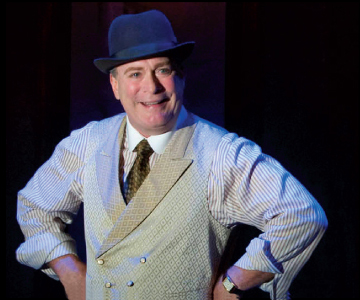Opening the Shaw Festival's new, intimate Studio Theatre, this potently staged and skillfully acted revival of John Osborne's brilliant, biting drama is, I suppose, a triumph for this great theater company, except that it has always been too long and too unpleasant to feel like a triumph. I'm not sure what it means that this is the first production I've seen [of three, including the original with Laurence Olivier] during which no one noticeably walked out. That's probably a reflection of the ShawFest's opening night audiences, notable Canadian theater artists and supporters, who are much too well-behaved to walk out. But The Entertainer is a difficult play to sit through.
The play is also a stretch for the Shaw Festival because it does not fit into even the current expanded version of the institution's mandate: it was first announced as staging the plays of George Bernard Shaw and his contemporaries, then enlarged to include later plays which deal with the times and issues of Shaw's long lifetime (1856 to 1950). Now the mandate is what artistic director Jackie Maxwell calls "a new stream of programming [which will] contextualize Bernard Shaw's work as part of a continuum of provocative, subversive playwriting." In a program-insert, she lists some "contemporary Shavians" (Churchill, Kushner, Parks, Healey, Fugard, Hare) who are also "provocative and subversive"; I suppose we will be seeing them next. But Ms. Maxwell feels that the best "new stream" work to start with is Osborne's "excoriating study of an England on the brink, The Entertainer-a cry of rage that attacks all that comes before, yet questions deeply what is left."
My thinking differs. First of all, however provocative and subversive Shaw may have been, his vaunted deep thinking now looks dated and windy, and few would still maintain that the long, trying essays accompanying his plays are his best writing. Shaw was a great dramatist and a master rhetorician: the arguments are the great moments in his plays not because of his original thought but because of their showy dramatic and rhetorical elan. In that sense, a better example of a "contemporary Shavian" might be Tom Stoppard (though Kushner isn't a bad choice). I have no problem with expanding the mandate to include more contemporary works. Canada's great Stratford Shakespearean Festival continues to play everything from South Pacific to an almost non-verbal dance-exercise based on "Moby Dick." But I find this specific rationale hokey.
Secondly, though it is certainly "a cry of rage," I don't think this play "attacks all that comes before." As Michael Billington points out in his splendid "Lament for a Dying England" (in the program), Osborne had much lingering affection for the old Music Hall and what it reflected and treats the way that Archie, the title character, struggles on to maintain his performances as a kind of final stubborn heroism. And the only member of this beyond-dysfunctional family whom Osborne never treats with disrespect is Billy, Archie's father, the old, retired vaudevillian. Archie shows his only affectionate regard for his youngest son, Frank when Frank makes amateur efforts to mimic the old Music Hall song and dance routines.
But as we watch this family's disintegration, framed by performances on the Music Hall stage in Archie's increasingly hostile relationship with bored audiences, we see this mean-spirited drama play out with the ugly fascination of a bloody accident. Director Jackie Maxwell has the tone right and keeps the inevitable process moving compellingly. We may want to see these characters bashed with a board, but they maintain their humanity.
Benedict Campbell lives up to Archie's great star-making role without ever losing the underlying pain that allows the character to show off while the actor never seems to. Olivier was more bitter and angry, but Campbell's Archie is fascinatingly a survivor while seemingly too depressed to rage. David Schurman has the panache and sad decency of the passed-over relic, Billy. Corrine Koslo is so wonderfully real and so infuriating as Archie's nagging wife Phoebe that she evokes alternating pity and real antagonism. And Krista Colosimo brings much life to the stepdaughter Jean, who calls attention to everyone's faults but somehow remains a cipher herself.
A strong supporting cast plays smaller roles, accompanies the 'performances' on the piano, and provides transitions. Designs are effective. But, once again, the theatrical experience is a lot more admirable than exhilarating. Though Osborne wrote it for Olivier, this play may be too agonizingly personal. More than in his other plays, Osborne's always-present sense of anguish and hurt suffuses The Entertainer. Archie's last line is, significantly, the inscription on Osborne's tombstone, "Let me know where you're working tomorrow night, and I'll come and see YOU." Olivier spat out that line like a curse. I like better Benedict Campbell's tone of reproach. He may be speaking for the playwright.

